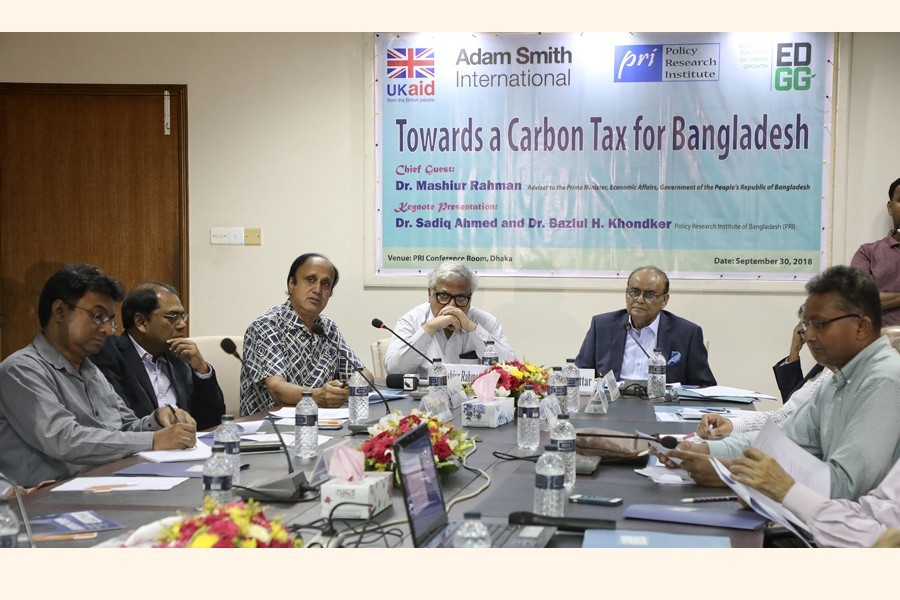Bangladesh should introduce carbon tax as a major way of reducing carbon emission and increasing government revenue, leading economic think tank Policy Research Institute has said.
A carbon tax can bring substantial reduction in carbon emission without hurting the long term GDP growth, PRI researchers said at a seminar in the capital on Sunday.
"Carbon tax not only lowers CO2 but it also yields revenues," PRI vice chairman Dr. Sadiq Ahmed said while delivering a keynote presentation during the event.
"These revenues can be used for investment in clean fuel, clean technology and infrastructure projects that can offset the loss of output from carbon taxes," Dr Sadiq added.
The PRI experts noted carbon tax is progressive in the sense that the increase in the cost of living as a result of the tax are the highest for the top 10 percentile and the lowest for the bottom 10 percentile.
"Additionally, the increase in cost of living for the poor can be offset through income transfers from the additional social protection spending from carbon taxes," he added.
The PRI experts argued gasoline tax can be conceived as a part of a longer term plan to introduce a proper carbon tax.
They observed that although, only a limited number of countries and territories had introduced a proper carbon tax, most oil importing countries impose a tax on gasoline on and above the normal VAT or sales tax.
"A gasoline tax at the pump gate raises the cost of transport but does not directly affect electricity and manufacturing production," Dr. Sadiq said.
"Also, in this case, other primary fuels such as natural gas, furnace oil, kerosene and coal are outside the tax net," he added.
PRI experts pointed out that while developed countries like the UK had imposed 71 per cent tax on gasoline, the rate is only 12.9 per cent in Bangladesh.
Speaking on the occasion, PRI executive director Ahsan H Mansur said that the additional revenue coming from carbon tax could be used for road construction.
"For example, currently, it takes 12 hours to go from Dhaka to Chittagong by road. But with improved road, that travel time can be brought down to four hours, which will ultimately reduce the cost of transportation and will help boost the overall economic activities", he said.
Executive Director of SANEM Dr. Selim Raihan said that the government should provide tax incentives for the environment-friendly goods and services while imposing technical non-tariff barriers on the harmful or toxic imports.
Managing director of Standard Chartered Bangladesh Alamgir Morshed, in his speech, recommended the introduction of 'Green Bond' and 'Carbon Derivative' in the country.
"Business entities that create more pollution should be required to put a certain portion of their revenue in that Green Bond," Mr Morshed said.
Economic adviser to the Prime Minister Dr. Mashiur Rahman, who attended the seminar as the chief guest, said it needs to be seen whether the carbon tax can be put within the broader budgetary plan of the government.
Referring to an observation about the growing use of coal in the country's energy mix and the construction of Rampal power plant in Bagerhat, the economic adviser said Rampal is located in an environmentally safe zone and the plant would greatly help to revitalise many industrial units in the southern region of the country.
Referring to another observation about the high cost of building the Rooppur Nuclear Power Plant, Mr Rahman said that one has to take into account the long term benefit of reduction in the cost of production once the plant is established.
Chairman of PRI Dr. Zaidi Sattar also spoke on the occasion.


